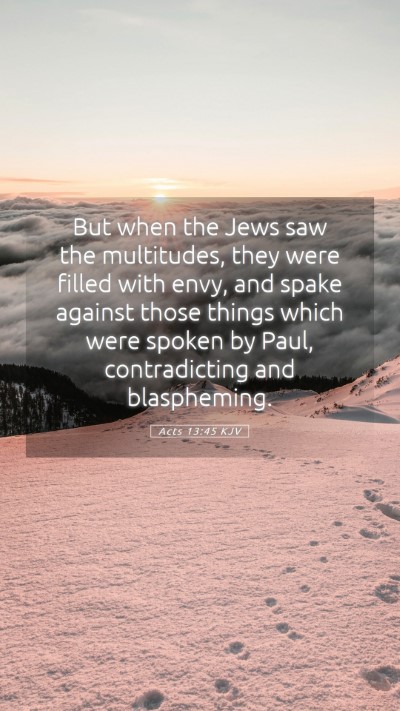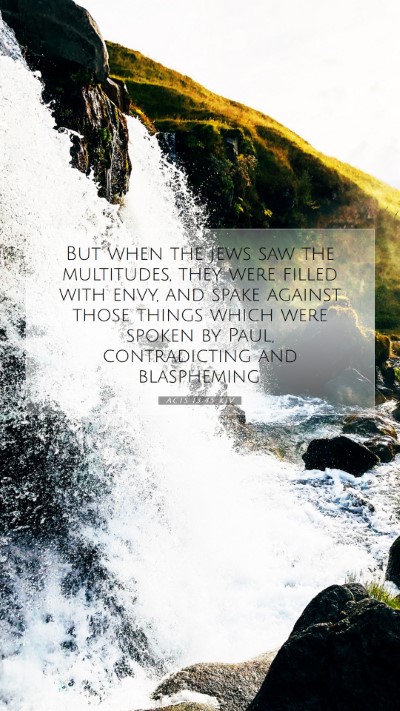Understanding Acts 13:45
Acts 13:45: "But when the Jews saw the multitudes, they were filled with envy, and spake against those things which were spoken by Paul, contradicting and blaspheming."
Introduction
This verse from the book of Acts is a profound moment in the early Christian church, illustrating the conflict between the early followers of Jesus and traditional Jewish teachings. Understanding this verse involves examining the context and the reactions of those who heard the message of the Gospel. The insights compiled from renowned public domain commentaries will enhance your Bible verse understanding and provide clarity to those seeking Bible verse explanations.
Contextual Background
The backdrop of Acts 13 involves Paul and Barnabas preaching in Antioch of Pisidia. Their message gained traction among the Gentiles, leading to a significant following. In this setting, it's crucial to grasp the tension that arose when the Jewish leaders witnessed large crowds drawn to Paul's teachings.
Commentary Insights
-
Matthew Henry:
Henry suggests that the Jews' envy was rooted in a fear of losing their traditional influence and authority. The sight of Gentiles embracing the Gospel threatened their long-held beliefs and positions within the community. This reaction exemplifies the recurring theme of resistance to the Gospel due to human pride and jealousy.
-
Albert Barnes:
Barnes emphasizes the contradictions presented by the Jews, indicating that their blasphemy was not merely against Paul but fundamentally against the truth of the Gospel. This hostility marks a pivotal shift in early Christianity, as the Jewish leadership's rejection becomes a catalyst for the church's outreach to the Gentiles.
-
Adam Clarke:
Clarke sheds light on the emotional intensity of this moment, portraying the Jews as incensed by the success of Paul’s preaching. Their vehement response underscores the deep-seated religious conflicts of the time and reveals the broader struggles followers of Christ faced in establishing their faith amid opposition. This also serves as a lesson in recognizing and confronting envy within spiritual matters.
Theological Implications
The response from the Jewish leaders reflects a larger theological battle between grace and works. Paul’s emphasis on salvation through faith was counter to the Jewish law, causing friction. This verse emphasizes transparency in spiritual leadership and the need for humility among believers.
Application for Today
In contemporary reflection, Acts 13:45 prompts believers to examine their responses to change and growth within the church. It also encourages individuals to confront any tendencies towards jealousy when witnessing others thrive spiritually. The events depicted invite us to stay true to our faith, even when faced with opposition.
Related Scripture Cross-References
- Acts 17:5: Similar opposition arises in Thessalonica, reflecting ongoing resistance.
- Matthew 27:18: Jealousy against Jesus shows the roots of opposition to divine truth.
- Romans 11:11: Paul discusses the purpose of Israel's stumbling leading to the Gentiles receiving mercy.
Conclusion
Acts 13:45 serves as a critical reminder of the challenges faced by the early church and the importance of understanding Scripture in its full context. As seekers of Bible study insights, we must equip ourselves with the necessary tools to interpret such verses effectively. This verse not only illustrates historical conflict but also provides modern believers guidance on how to navigate jealousy and opposition in their own spiritual journeys.
Whether you're part of bible study groups or engaging in personal Bible study, remembering the lessons from Acts 13:45 can foster deeper understanding and fellowship.


